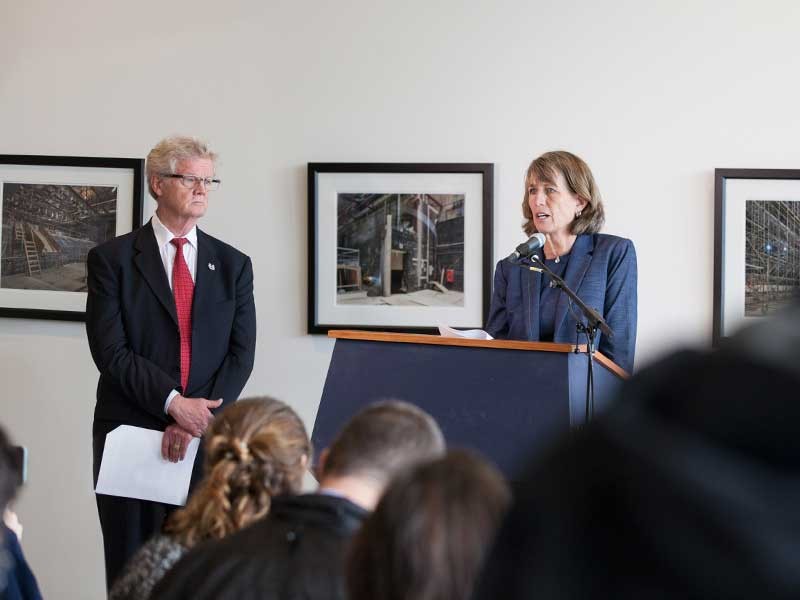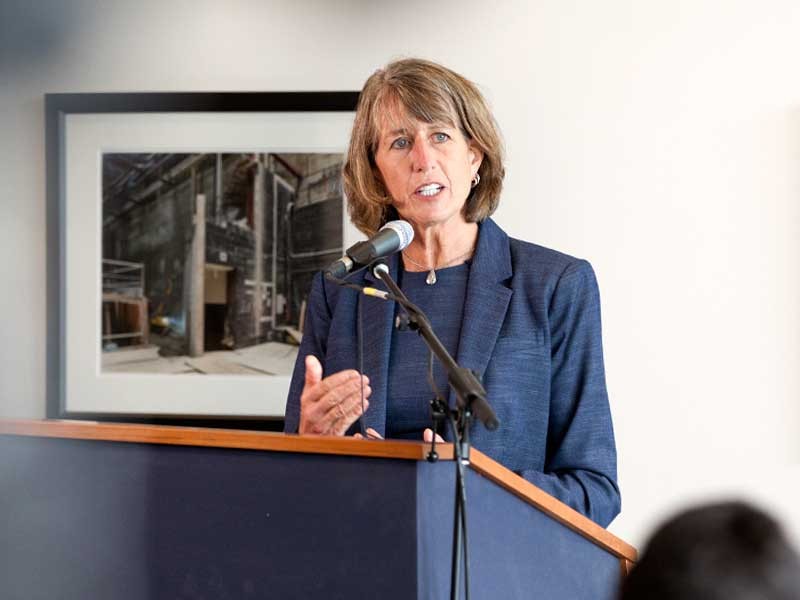USU Chair Burnett, Pres. Cockett Discuss Investigation into Piano Program
Jody K. Burnett, Chair of Utah State University's Board of Trustees, and Noelle E. Cockett, President of USU, address reporters during a press conference announcing the results of an independent review of the Piano Program.
Jody K. Burnett, Chair of Utah State University’s Board of Trustees, and Noelle E. Cockett, President of USU, held a press conference Friday morning at the Chase Fine Arts Center to discuss the results of an independent investigation of the university’s Piano Program.
Several reports on social media by former students of USU’s Piano Program claimed occurrences of sexual assault, harassment and gender discriminations. As a result, Cockett announced on February 16, 2018, that the university hired an outside, independent organization to investigate.
During the press conference, Burnett and Cockett discussed the results of the investigation, its recommendations and action Cockett has taken to address issues discovered by the independent investigation.
Below is a transcript of the press conference:
Chair Jody K. Burnett
“My name is Jody Burnett, and I’m Chair of Utah State University’s Board of Trustees.
“Thank you all for coming today. Let me outline the order of business today. I’m going to start with a very quick summary of what President Cockett charged the independent investigator to do. After that, President Cockett will make some initial remarks. Then I will read the recommendations one at a time, after which President Cockett will answer in each case with the actions she will take or has taken to address that specific recommendation. We will leave time for questions after President Cockett’s concluding remarks.
“When the university heard about the problems that came to light on social media in late February, President Cockett alerted me as Chair of the Board of Trustees that she was going to contract with an outside law firm to conduct a thorough, independent review of the situation and all of the allegations and to come back to the Board of Trustees with recommendations. The university hired attorney Alan Sullivan of the law firm Snell and Wilmer in Salt Lake City.
“The university asked Mr. Sullivan to go wherever his interviews took him and to not hold back. Then we got out of his way. That is, the university very purposefully did not ask questions or talk to anyone because we didn’t want to bias Mr. Sullivan’s investigation in any way. We also asked him to list any problems he saw and, importantly, to make recommendations about what we could do to address those issues. His report was to come to me as Chair of the Board of Trustees.
“Today, we have his report, and President Cockett is here to discuss his recommendations. Right now I’d like to turn the time over to President Cockett.”
President Noelle E. Cockett
“Thank you for coming today. Over the past year, we have witnessed a movement that is sweeping through our country. People – women in most but not all cases – are speaking up, telling heart-wrenching personal stories of abuse, mistreatment and sexual assault. As you know, that movement hit Utah State University in our Piano Program earlier this year. USU students – again, women in most but not all cases – made their voices and their stories heard. They wanted to make sure the things that happened in our past to our students – to them – never happens to anyone else.
“I want to start by thanking those who came forward. Thank you for being so brave. Thank you for demanding changes at Utah State. We are moving forward because of your exceptional strength.
“However, we cannot move forward as an institution if we do not own up to our past mistakes. Each of us at Utah State has to dig deeply into ourselves and come out the other end with solutions to these problems and a commitment to preventing these actions in the future.
“Step one in moving forward is standing up and admitting that we at Utah State made mistakes in the way we handled issues of abuse, of mistreatment of students and even of instances of sexual assault.
“Step two is taking action to ensure that we correct those mistakes and that we put in place policies and procedures to protect the health and well-being of our students. But we also must cultivate a foundation at USU that demonstrates our absolute commitment to making our campus a safe and healthy environment, where students can reach their full potentials.
“As president, I have made the strongest commitment I can to establish a campus culture intolerant of this kind of behavior. However, I can’t do this alone – it will take all of us within the campus community. We have a shared responsibility – faculty, staff and administration. This is a community call to action. But I am confident that we can move forward as an institution.
“I’ll now turn the time back to Chair Burnett, who will read the recommendations in the report, and then, as he stated, he will ask me to respond to each of these recommendations.”
Chair Burnett
“Thank you. As I mentioned, the report lists six recommendations.
“The first recommendation addresses the status of Professor Gary Amano. The report concludes that for decades, Professor Amano created a hostile academic environment for women and discriminated against females on the basis of gender, and that he tolerated sexual harassment of students. The report recommends the university initiate a proceeding for the dismissal of Professor Amano.”
President Cockett
“On Monday, April 2, Professor Amano submitted a letter announcing his retirement effective that day. Professor Amano is no longer working at Utah State University.”
Chair Burnett
“Although many of the subjects of this investigation have elected to share their names with many of you in the media and those names have been published, we do have privacy obligations that stem from our policies and federal and state law. So in order to honor those student privacy concerns, many of the names have been redacted.
“The second recommendation falls in that category. The recommendation states: ‘For reasons that should be apparent in this report, the university should not allow (name redacted) to rejoin the faculty or participate in any way in the Youth Conservatory or the Piano Clinic.’”
President Cockett
“As you heard, the university’s obligation to protect the privacy of individual students prevents me from providing specific details on this recommendation. However, even prior to the release of this report, this individual was barred from further employment at Utah State University.”
Chair Burnett
“The third recommendation addresses the status of Professor Dennis Hirst. The report concludes that Professor Hirst enabled Professor Amano’s discriminatory acts, or ignored them without taking meaningful actions to correct the problems. The review does not recommend a specific sanction for Professor Hirst, but it does list some possible actions the university could take.”
President Cockett
“Professor Hirst has been removed as Piano Program Coordinator. The university will also move forward with a sanction process against Professor Hirst. The recommended outcome of that sanction is being determined.”
Chair Burnett
“The fourth recommendation addresses the broader issue of Standards for Faculty Behavior Toward Students: The report states, and I quote, ‘We do not believe that the policies of the university clearly prohibit psychologically abusive behavior by the faculty.’ It goes on to recommend that the Caine College of Arts develop standards for faculty behavior that ensure students are appropriately challenged and held to rigorous standards, but without humiliation or ridicule by faculty. It also recommends the Caine College establish clear procedures for the evaluation of student complaints of serious mistreatment and for counseling of faculty who violate standards of behavior.”
President Cockett
“The current Music Department Head, Cindy Dewey, faculty members and the Music Department and the piano program have already implemented changes that address some of the issues that the department has seen as problematic. These changes were started within the last 12 months, and I will list a few of those actions:
“The department has developed a code of ethics for treatment of students, a definition of misbehavior by faculty members.
“A broad-based departmental board has been established to review student allegations of discrimination and abuse. And then take those allegations forward.
“Scholarships are now recommended at the program level based on a point system where a three-member panel’s scores are combined. And then the final awarding of scholarship across the department are approved at the department level by the department head.
“I also want to say that we have provided counseling to our students through the CAPS program. And we have encouraged individuals to reach out through that resource as needed.
“Other actions are being considered by the college. They include: A dedicated counselor assigned to students of the Caine College of the Arts. Observation windows in all one-on-one instruction rooms are being considered to being added, as well as cameras in areas where instruction is conducted. And the college administration group is working on more changes and actions that will be implemented within the near time frame.
“In addition, I have charged Provost Larry Smith and the Faculty Senate Presidency, including President Kim Lott, to consider revisions of the USU policy. Specifically, we are recommending revisions of USU Policy 403 to expand faculty conduct expectations and more-clearly prohibit student mistreatment.
“Another revision that we are requesting is with USU Policy 407 to simplify approaches to faculty discipline, and provide a more clear and timely process for addressing student complaints.
“What I want to stress here is that I plan to work closely with our faculty to address issues that affect the safety and well-being of our students. And I’m also concerned about the health and well-being of our faculty and staff.
“These are some of the actions that we have implemented, and more will be coming forth in the next time period.”
Chair Burnett
“The fifth recommendation the report addresses moving forward is to adopt a plan to eliminate gender discrimination. The report recommends the Caine College of the Arts work with Piano Program faculty, the Office of the university’s General Counsel, and the Title IX Office to formulate a plan to eliminate gender discrimination in the Piano Program. This includes grading processes, awarding scholarships and hiring processes for faculty to advance gender balance. The report notes, as President Cockett alluded to, steps already taken by the Piano Program since August of 2017 to address some of these issues, including transparency and fairness in the awarding scholarships.”
President Cockett
“As I outlined earlier, there are changes that have been implemented, and there are more that will be considered, both at the Piano Program and the Music Department level.
“But in addition, I’m extending the university’s actions beyond the report’s recommendations to implement a university-wide review of gender discrimination of students, staff and faculty. I will be announcing a task force on this issue in the next few weeks. I have asked Ronda Callister, a professor in the Business Management in the Huntsman School of Business to help me with this task. Professor Callister is an expert in gender inequality and was the principal investigator on a $3 million NSF Advance grant to address gender inequality at USU. Together, Ronda and I will determine the objectives, charges and membership of the task force.”
Chair Burnett
“The sixth and final recommendation in the report addresses the status of our Title IX Office. The review points out a number of shortcomings in our Title IX investigations and taking disciplinary action against faculty accused of misconduct, about the evaluation of the general university climate in regards to discrimination, and about sexual harassment investigations, among other things.”
President Cockett
“Working with the Provost, I have initiated a reorganization of the Title IX Office. This reorganization includes leadership changes, the addition of more staff, increased compliance oversight and a position to oversee prevention training. The authority and scope of Title IX must be undeniable here on campus.
“The university has made great strides in improving our response to and prevention of sexual violence. Still, we have now concluded that additional changes and actions are needed. As a university we are committed to these issues, and we will continue to work until they are fixed.
“As a final note, our faculty and staff are deeply dedicated to students’ health, safety and well-being. However, this report outlines the culture of discrimination, which is a form of power imbalance. In addition to empowering our students to demand action, I am also empowering faculty and staff to demand an end to power imbalance when they observe it and when they are subject to it.
“I want the university community and the public to understand that these issues that showed up in the review don’t just affect those who experience them directly. These issues challenge the very mission of our university and threaten the futures and careers of more than just the victims, more than just those directly involved. “And again, it is my strongest commitment to move this university forward, to better assure the safety and well-being and care of our student, staff and faculty.”
Contacts: Tim Vitale, 435-797-1359, tim.vitale@usu.edu
Eric Warren, 435-881-8439, eric.warren@usu.edu
President Cockett outlines recommendations and action to address issues discovered by the independent investigation.
TOPICS
President 84storiesComments and questions regarding this article may be directed to the contact person listed on this page.








